
Guests
- John Mearsheimerprofessor of political science at the University of Chicago.
- Denys Pilashpolitical scientist and member of the Ukrainian democratic socialist organization Sotsialnyi Rukh.
President Trump says he is working on a “deal” to end the Russia-Ukraine war by hosting a series of meetings between the U.S., European Union, Russia’s Vladimir Putin and Ukraine’s Volodymyr Zelensky. Putin is insisting Russia keep areas of Ukraine that it has seized, including the long-contested Donbas region, while Zelensky is asking the U.S. for security guarantees to prevent future invasion by its powerful neighbor. We host a conversation with two political scientists, University of Chicago professor John Mearsheimer and Ukrainian democratic socialist Denys Pilash, about the likely outcome of the talks and the roots of the conflict. Mearsheimer says “the sides remain so far apart” when it comes to the possibility of a ceasefire during peace negotiations that “the best outcome would be to settle this war now.” Pilash, on the other hand, says there are still measures that can be taken to pressure Russia to agree to a ceasefire and to secure more favorable postwar terms for Ukraine.
Transcript
AMY GOODMAN: President Trump says he’s begun arranging for a summit between Ukrainian President Volodymyr Zelensky and Russian President Vladimir Putin, followed by a trilateral summit with the goal of ending Russia’s war on Ukraine. Trump made the announcement after hosting a high-stakes summit at the White House with Zelensky and seven European leaders — British Prime Minister Keir Starmer, French President Emmanuel Macron, Italian Prime Minister Giorgia Meloni, German Chancellor Friedrich Merz, Finland’s President Alexander Stubb, European Commission President Ursula von der Leyen and NATO Secretary General Mark Rutte. The meeting came three days after Trump held face-to-face talks with Putin in Alaska.
Major differences remain between Ukraine and Russia. Trump also talked to Putin for 40 minutes in the midst of his meeting with the European leaders and Zelensky. Putin is insisting Russia keep areas of Ukraine that it seized, including the Donbas region. During his meeting with Trump, Zelensky stressed the importance of security guarantees for Ukraine.
PRESIDENT VOLODYMYR ZELENSKY: This is a part, I think. It’s not a part for the war and to defend us; it also will be a part for security guarantees to strengthen our army, to rearm Ukrainian army. This is very, very important. And it depends how much money we need to rearm. For example, the question of air defense, we spoke about it with President Trump, and I’m happy that we have now bilateral decisions, and we will work on it with production, American production. Nobody in Europe has so many air defense, like Patriots, for example. We need it very much. And this is also about defending.
AMY GOODMAN: After the meeting, President Trump promised the U.S. would help guarantee Ukraine’s security in any future peace deal with Russia, but said European countries would lead the efforts, and didn’t clarify whether he’d send U.S. forces to Ukrainian soil. The Financial Times reports Ukraine offered the U.S. a $100 billion weapons deal to help win security guarantees.
During the White House summit, German Chancellor Friedrich Merz pressed for a ceasefire before Russia and Ukraine hold direct talks.
CHANCELLOR FRIEDRICH MERZ: The next steps ahead are the more complicated ones now. The path is open. You opened it last Friday. But now the way is open for complicated negotiations. And to be honest, we all would like to see a ceasefire, at the latest from the next meeting on. I can’t imagine that the next meeting would took place without a ceasefire. So, let’s work on that, and let’s try to put pressure on Russia, because the credibility of these efforts, these efforts we are undertaking today, are depending on at least a ceasefire from the beginning of the serious negotiations, from next step on. So, I would like to emphasize this aspect and would like to see a ceasefire from the next meeting, which should be a trilateral meeting, wherever it takes place.
AMY GOODMAN: Although before Trump’s summit with Putin in Alaska he promised “severe consequences” if Putin didn’t agree to a ceasefire, he is now dismissing the need for an immediate ceasefire in Ukraine.
PRESIDENT DONALD TRUMP: I don’t think you need a ceasefire. You know, if you look at the six deals that I settled this year, they were all at war. I didn’t do any ceasefires. And I know that it might be good to have, but I can also understand, strategically, well, you know, one country or the other wouldn’t want it. You have a ceasefire, and they rebuild and rebuild and rebuild. And, you know, maybe they don’t want that. But if you look at the six deals that we made peace, and, you know, long-term, long-running wars, I didn’t do any ceasefires.
AMY GOODMAN: This all comes as Russia launched 270 drones and 10 missiles overnight in what’s being called Russia’s largest airstrike on Ukraine since July.
We’re joined now by two guests. John Mearsheimer is a professor of political science at the University of Chicago, author of, most recently, How States Think: The Rationality of Foreign Policy. In 2014, he wrote a widely read piece for Foreign Affairs headlined “Why the Ukraine Crisis Is the West’s Fault.” He’s joining us from Chicago. And in Kyiv, the capital of Ukraine, we’re joined by Denys Pilash, a Ukrainian political scientist, historian, a member of the Ukrainian democratic socialist organization Sotsialnyi Rukh, and an editor at Commons: Journal of Social Criticism.
Let’s begin with Denys Pilash in Kyiv. Actually, we’re going to go to Professor Mearsheimer in Chicago. If you can respond to what’s taken place? We just had you on Friday, but that was even before the Trump-Putin summit in Alaska. So, these developments, that are quite historic, over the last few days, from that summit to the meeting at the White House, and what you think has been accomplished?
JOHN MEARSHEIMER: Well, I don’t think that much has changed, Amy. I think the Europeans and the Ukrainians remain deeply committed to a ceasefire, the Russians are opposed, and Trump made it clear that there was not going to be a ceasefire.
With regard to a real peace agreement, I think the sides remain so far apart that it’s hard to imagine that you’re going to get a peace agreement. What Trump would like to do is he’d like Zelensky and Putin to sit down and work out a deal, but I don’t understand how that could possibly happen, given the position of the Europeans and the Ukrainians, on one side, and the Russians, on the other side.
The third thing that I take away from this meeting is that you see that the Europeans and Ukraine are basically joined at the hip. There is hardly any daylight between the positions on each side. And the outlier here is really Trump. If you look at the meeting, you just look at the photographs, you listen to the conversation, it’s really like Trump arrayed against the Europeans and the Ukrainians. And I think what Trump is trying to do — and you saw this reflected in the meeting — is he’s trying to move away ever so gently from this conflict. He is no longer interested in taking full responsibility, and he’s putting the burden of dealing with the Russians on the Ukrainians and on the Europeans. And this is why he’s pushing for a meeting between President Putin and President Zelensky that does not include him, because he wants them to figure out how to solve it. He’s tried. He’s been unable to do it.
AMY GOODMAN: I want to get Denys Pilash’s take — we just had our connection drop in the capital Kyiv, but I think we’re reconnected right now — the Ukrainian political scientist, historian, member of the Ukrainian democratic socialist organization. As you look at what happened in Alaska, Denys, on Friday, right through to this historic meeting at the White House on Monday, your response to whether you think there’s been any progress made, and if you think a peace deal is on the horizon?
DENYS PILASH: Well, honestly, it isn’t likely that a real peace deal, or even a ceasefire, is on the horizon, because the war, that was deliberately unleashed on Ukrainian people by the Russian leadership and that is now ongoing for more than three years, well, the coming of Trump to the White House has only made things worse, because what we have seen from the current administration in Washington, this arguably the most far-right administration in the U.S. history, was a appeasement strategy, was like emphasizing their affinity with Putin and with other authoritarian leaders throughout the world. And this Alaska meeting, many people were really afraid that this can be something akin to Munich Conference back in 1938 with the carving out Czechoslovakia without the presence even of the representatives of the government, Edvard Beneš, the president, and others. But, ultimately, it seems that no real difference was made.
And now in the latest meeting, maybe President Zelensky had to set another world record for saying “thank you” per minute or appeasing, pleasing the Marjorie Taylor Greene’s boyfriend with his suit, but it seems that the positions of the sides, they haven’t really changed, and that Russia is still pushing for these maximalist demands, for grabbing as much Ukrainian land as it can, even that, those territories, and this means also the people living there, that haven’t been occupied by Russian forces yet. And ultimately, there is no actual bona fide agreement and no real intention to make real peace talks and really find any sort of compromise, because this is all about this right of the force that is imposed on a weaker country. And now many people were going across with all these narratives of the so-called proxy war.
But now when we see images of, for instance, Ukrainians being deported, together with other people, subject to this completely humiliating ICE procedures from the U.S. — and no person is illegal — and, for instance, images of Russian armored personnel carrier waving both Russian and American flags invading Ukrainian land, maybe this means that in this situation, Trump and Putin are clearly on one side, that Putin is now being supported and promoted by the current U.S. administration.
AMY GOODMAN: What do you think of President Trump backtracking on the issue of a ceasefire? He seems to be saying they can get to a peace deal without needing an interim ceasefire. But the idea that before he met with President Putin, he said Putin would face serious consequences, you know, sanctions, if he didn’t agree to a ceasefire, but now he says he doesn’t see the need, and that in other peace deals he’s negotiated, they didn’t have to have a ceasefire first.
DENYS PILASH: Yeah, so this is another concession made by Trump for Putin. And it was rather uncommon for him to make any harsh statements towards the Kremlin today, because, ultimately, from his coming to power 'til now, the main line was really to find ways to really court Vladimir Putin. And it seems that in order to be really greeted by the current U.S. government, you need to be at least a war criminal wanted by the International Criminal Court, so this goes for both Netanyahu and Putin, and if you are not, then you are humiliated, and you're put into completely uneven, unequal conditions by Trump, Vance and their cronies.
So, this means that the line of the Russian government, that is to deny any prospect for the ceasefire — and ceasefire should be the meaningful prerequisite for any sort of further talks. Yes, if we — if they don’t agree stop — to stop killing civilians, to stop attacks on civilian infrastructure, what are any prospects of any, you know, like, agreement, if they cannot make this simple concession? And this was the line of Moscow for the entirety of this time, to deny, to reject any proposals, any suggestions to stop killing civilians.
In just these days, we’ve experienced another attacks on Ukrainian cities. It has to be said that June and July have been one of the deadliest months since the outset of the full-scale invasion back in February 2022, by the number of civilian death toll. And for instance, recently, Sumy State University premises has been destroyed by Russian shelling. And this meant that another educational facility joined thousands of universities, schools, hospitals that have been destroyed or damaged by Russian attacks. So, you could see no even pretending to go to some compromise on the Russian side. It’s still their language ultimatums and pressuring and actually razing Ukrainian cities to the ground.
AMY GOODMAN: So, let’s get the response of professor John Mearsheimer. If you can respond to what Denys Pilash has said? And also, talk about this issue of, you know, if Ukraine doesn’t join NATO, that they get — and it might have surprised many, especially on the MAGA right — this possibility of U.S. security guarantees, which could lead up to U.S. troops on the ground in Ukraine.
JOHN MEARSHEIMER: Well, my main argument in response to what Mr. Pilash said is that he greatly overestimates what President Trump can do here. The fact is, the Russians say unequivocally that they will not accept a ceasefire. What is Trump supposed to do? He can’t force the Russians to accept a ceasefire. What Trump has done is he’s recognized reality, which is you’re not going to get a ceasefire. And therefore, he’s moved on to talking about a peace agreement. He has no choice. Trump is powerless in this regard.
Secondly, with regard to working out some sort of peace deal, Trump can’t do it. And the reason Trump can’t do it is because the Ukrainians and the Europeans, on one side, and the Russians, on the other side, are miles apart. There’s no basis for compromise here. And Trump can’t create a basis for compromise. And furthermore, he can’t coerce the Russians into agreeing to Ukraine’s terms, and he can’t coerce the Ukrainians and the Europeans, on the other side, to agree to Russia’s terms.
So, this one is going to be settled on the battlefield. And what Trump wants to do is he wants to back away, and he wants to turn responsibility for this war mainly over to the Europeans and the Ukrainians. Let them see what happens on the battlefield, and then they could work out an arrangement with Putin. This is the direction that we’re headed in.
Now, the second question you ask, Amy, is: What do I think about security guarantees? What the Ukrainians want and what the Europeans want is for the United States to give Ukraine a viable security guarantee, something akin to Article 5 of the NATO Treaty. This is categorically unacceptable to the Russians. This war is all about Ukraine’s membership in NATO and Ukraine having a security guarantee from NATO. That’s unacceptable to the Russians. And you have to understand that if Ukraine is not in NATO, yet Ukraine has a security guarantee, a real security guarantee, from the United States, that’s effectively the same thing as being inside of NATO. And the Russians are not going to tolerate that. So, what you’ll get, if you get a security guarantee, is some sort of vague language that has no real punch to it, and at the same time, the Russians will make it clear that they will have a veto over any U.S. or European commitment to coming to the aid of Ukraine at a crisis. So you’re not going to get a security guarantee. You’re not going to get European troops stationed on Ukrainian soil.
And the Russians are going to continue to demand that Ukrainians disarm to the point where it has no offensive capability against Russia. But, of course, the Europeans are arguing, and Ukraine is arguing, that, if anything, what should happen here is that the Europeans and the Americans should be allowed to rearm Ukraine and make it stronger. This is antithetical to the Russians. Again, this is why you have no agreement on substance. And even if Trump succeeds in getting Putin and Zelensky to sit down and talk, I ask: Where is that going to lead, given that they don’t agree on anything?
AMY GOODMAN: On the issue of security guarantees, you know, Article 5-like guarantees, because Ukraine isn’t a part of NATO, Denys Pilash, what are your thoughts on what this would mean, whether it’s European security guarantees or U.S.?
DENYS PILASH: Well, first of all, I would like to respond to this general narrative about this everything about NATO. Ukraine wasn’t going to be a member of NATO, because of the position of the major European member states. And this was well known. And actually, the main salesman for NATO, both in Ukraine and in the Nordic countries, in Sweden and Finland, was Putin himself, because prior to the annexation of Crimea and to stirring up the war in Donbas by Russia, the support for NATO membership in Ukraine was rather low, and it was a very vague prospect that wasn’t really pursued. And only after all this Russian aggression happened, it was skyrocketing. And the same goes for Finland, for instance. And given the fact that Finland joined NATO, and the Russia-NATO border has doubled, we see no reaction on the side of Russia, although if we give into this assumption that it’s all about NATO, then they would panic that NATO is coming to Saint Petersburg, and so on. But it doesn’t happen, because, actually, the reason for the war is much more complex, and it’s rooted in the agency of Russian imperialism itself.
And what’s really appalling in many people on the left falling for these narratives that are pursued by Mr. Mearsheimer is that we really abandon class analysis. We forget about what everything is about, that states aren’t some sort of monolithic interest. They are comprised of different classes and their contradictions, and even the ruling classes have their internal contradictions. And there is lots of reasons — economic, ideological, political — that lay behind these complex issues. And just by, you know, rejecting domestic factors as shaping international policy, as well, we go nowhere.
So, now, if we speak about what’s happening now, so, obviously, Ukraine needs some sort of guarantees. And without it, it seems completely futile, because the so-called peace agreement will mean just — not just abandoning millions of people for the sake of the occupier, with all the brutality of occupation. And I can just mention I used to work briefly with the journalist Viktoriia Roshchyna. So, she was kidnapped at the occupied territories. She was detained illegally by the Russians. She was ultimately tortured and killed, and then her body was returned with organs missing to conceal the tortures. And this is a fate that is really not that uncommon for the people in this gray zone of the occupation. But this also means that Ukraine will be completely harmed, you know, like, without any protection from further Russian attacks. So, at any point, Russia will have all the capacity and no restraints to repeat what they did back in 2022. So, what sort of peace are we even arguing about? This is not a peace. This is a continuation of the war. This is the war and occupation in other terms.
So, ultimately, it’s quite natural that Ukraine, the people of Ukraine, they want some guarantees that the situation with Budapest Memorandum, that was just torn apart by one of its states that was guaranteeing it, that it’s not repeated. And, well, this means that you need to have countries that will provide some sort of guarantees that they will act against further attempts of aggression. This doesn’t mean purely Western countries. You can try to reach out to the countries of the Global South, because the precedent that is set by the Russian invasion of Ukraine, that one country tries to redraw unilaterally international borders by the war of aggression, it may unleash an even worse mayhem throughout the world if it’s really enshrined in a sort of, you know, like, agreement where we reward the aggressor.
AMY GOODMAN: Denys Pilash —
DENYS PILASH: So, this will have very dire consequences for countries throughout other regions, as well. So, we can also try to get a broader picture, a broader framework, and a broader number of countries that can act in order to prevent this. But, obviously, what’s now on the table and what’s pursued by Washington isn’t really interested in any sort of guaranteeing Ukrainian integrity, security, anything. So, it’s all about dividing the world into spheres of influence and then this world carved up by this great state —
AMY GOODMAN: Let me ask — let me ask —
DENYS PILASH: — everyone can do whatever they want in their backyard.
AMY GOODMAN: Let me ask John —
DENYS PILASH: So, this is the same for Putin, as well.
AMY GOODMAN: Let me ask Professor Mearsheimer about something you’ve written, Denys Pilash. Professor Mearsheimer, Pilash warns of a new axis emerging, bringing together Trump, Putin, Netanyahu, the far right in Europe and various authoritarian regimes from around the world, calling for the left to defend a renewed internationalism that opposes all oppressors. Your response?
JOHN MEARSHEIMER: Well, I think that Trump is simply trying to improve relations with Russia in this case, and he’s simply trying to shut down the Ukraine war. I think that is in the America’s — Americans’ national interest, America’s national interest. I think it is in Ukraine’s national interest. I think if we could end this war, that would be a good thing. I do not think that Trump is interested in joining in to some sort of worldwide alliance with right-wing governments, including the Russian government, to suppress liberal democracies around the world. I don’t think that that’s happening here.
AMY GOODMAN: It’s interesting, because —
JOHN MEARSHEIMER: I think that what Trump —
AMY GOODMAN: — aren’t you very critical of Trump when it comes to what’s happening in Gaza and his support from Netanyahu? It’s interesting to see that table yesterday at the White House, where you have one European leader after another demanding a ceasefire, what Merz is calling for, an arms embargo against Israel. You’ve got Starmer and Macron calling for recognition of the Palestinian state. It would be interesting for them to take on Israel’s occupation of Gaza and what’s going on there at the same time they were talking about Ukraine.
JOHN MEARSHEIMER: You’re not going to get any argument from me on that. The whole question of U.S. policy toward Israel is fundamentally different than the question of U.S. policy towards Russia. I think that U.S. policy toward Israel, especially with regard to Gaza, is abhorrent. You know that. But I think Russia is a different matter.
I think that Trump is on the right side with regard to Ukraine. He’s not interested in selling the Ukrainians down the river. He doesn’t have animosity towards Ukraine. What Trump is interested in doing is trying to get the Ukrainians to recognize reality and to understand that from Ukraine’s point of view, the best outcome would be to settle this war now. Yes, is it going to be settled on terms that are favorable to the Russians? Of course, because the Russians are in the driver’s seat on the battlefield, and there’s nothing that Ukraine and the United States can do to reverse that situation. But he’s not, Trump, trying to sell the Ukrainians down the river. He’s trying to settle this war. And he can’t do it, because the Ukrainians and the Europeans, on one side, and the Russians, on the other side, can’t reach any sort of agreement on the terms of a settlement. But that’s basically what’s going on here.
AMY GOODMAN: Denys Pilash, your response? And do you agree that this is going to be settled on the battlefield? Is this what you want to see?
DENYS PILASH: No, this is only a part of the, again, broader picture, because still there are things that can be done to curb Russia’s potential to wage this imperialist, aggressive war. And still there are many loopholes in the economic sanctions against Russia that are, like, taken up only recently. For instance, the case of the shadow fleet of Russian oil tankers that are shipping oil under other — guise of other countries and actually profiteering the Russian war machine. And still there is a lot of things that could be done, actually, to reframe, redraw the broader security architecture, and not to, you know, reward aggressive states. So, this is not just about what’s happening on the battlefield, but it’s part of the — obviously, it’s a part of the broader picture.
And while Russia is going with all this indiscriminate killing of Ukrainians, regardless they are civilians or servicemen, who used to be yesterday civilians, I stay — stand on the Maidan Nezalezhnosti Square, where just yesterday we had the funeral of our comrade, anarchist activist and artist David Chichkan, who also died on the frontline because he deemed Russia to be a major fascist threat, and he, as many Ukrainians, saw no other option as to take up arms and to resist.
But, ultimately, this is, again, about not trying to make the picture more rosier for the aggressor and trying to — for whatever it does, then we hear these responses that there is some rationale behind this. And Mr. Mearsheimer and his co-author, they went so far to try to rationalize even the decision of Hitler to start the worst bloodbath in world history by attacking the Soviet Union in the Second World War. But, ultimately, this is nothing rational and nothing pragmatic in resorting to war as your main way of doing international policy. And —
AMY GOODMAN: I’m going to —
DENYS PILASH: — this means that we need to really be consistent in the positions, both on Ukraine, on Palestine, and broader, for all those people who are subject to oppression, to aggression, to subjugation, to more powerful imperialist or subimperialist forces. So, this needs, at least for the people on the left who believe in progressive values, that we are against any such policies and that we unite in our solidarity.
And first of all, this means that we should at least try to listen to each other, to understand the situation on the ground, to listen to the people on the ground. And, well, it’s sometimes also appalling when we see major outlets who try to discuss Ukraine or Central-Eastern Europe without even inviting people from the region, just some Westerners. And I think, I hope, that Democracy Now!, that has done so much great things to expose the truth, and you personally, Amy, starting from the genocide in East Timor, to give voice to the oppressed, to the attacked, that you will go on to invite more voices from our region and more voices from oppressed peoples throughout the world. Thanks.
AMY GOODMAN: Well, we’re going to have it. I thank you so much, Denys Pilash, for joining us from Ukraine’s capital, from Kyiv. Denys Pilash is a Ukrainian political scientist and historian, a member of the Ukrainian democratic socialist organization and editor at Commons: The Journal of Social Criticism. And thanks so much to John Mearsheimer, political science professor at the University of Chicago, speaking to us from Chicago.
Coming up, we go to California, where an immigrant rights activist and nurse was violently detained while monitoring ICE agents earlier this month. Stay with us.
[break]
AMY GOODMAN: iLe, performing in our Democracy Now! studio.

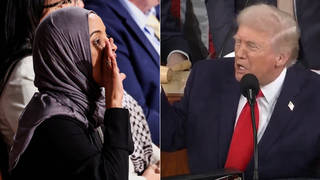
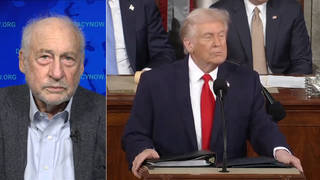
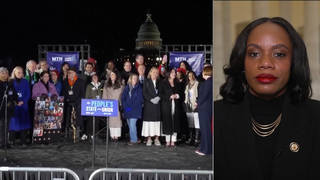
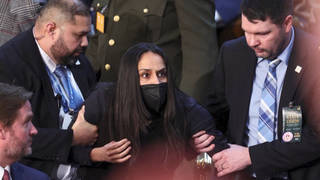






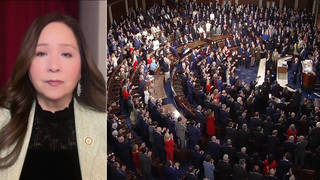
Media Options